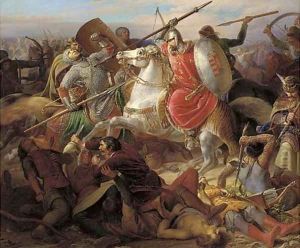Eduard Engerth Paintings
Eduard Engerth, born in Pleß, Prussia (now Pszczyna, Poland) on May 13, 1818, and passing away in Rodaun near Vienna, Austria, on June 28, 1897, was a distinguished Austrian painter known for his historical and portrait paintings. Engerth's journey into the arts began at the Academy of Fine Arts Vienna, where he studied under the guidance of Leopold Kupelwieser and Franz Eybl, both of whom played significant roles in shaping the artistic landscape of Vienna in the 19th century. Engerth's academic roots laid a solid foundation for his career, allowing him to develop a style that combined the grandeur of historical painting with the intimacy of portraiture.
Throughout his career, Engerth received numerous commissions that allowed him to showcase his talent across Austria and beyond. One of his most notable works is the fresco in the staircase of the Vienna State Opera, which remains a testament to his skill and creativity. Engerth's ability to capture the essence of his subjects, along with his technical proficiency and attention to detail, earned him recognition and respect among his contemporaries.
In addition to his contributions to the art world, Engerth also served as the director of the Academy of Fine Arts in Prague from 1871 to 1877, where he influenced a new generation of artists. His tenure at the academy was marked by a commitment to nurturing the talents of his students, and his legacy includes not only his own artworks but also the impact he had on the development of future artists. Engerth's work and his dedication to the arts have left an enduring mark on the artistic heritage of Austria and Central Europe, making him a significant figure in the history of 19th-century European art.
